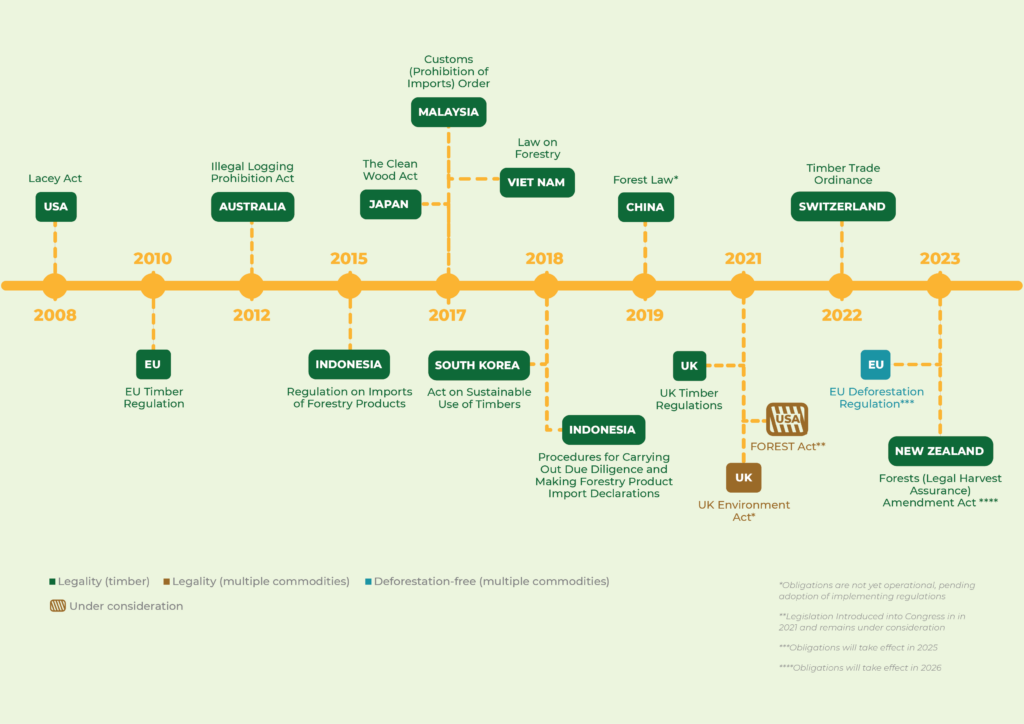Forest governance generally refers to legal and policy frameworks that regulate land use. Strong governance systems provide opportunities to improve legal frameworks, expand opportunities for local stakeholders to influence and participate in decision making, and ensure the protection of ecosystem values and sustainable and adaptive management of resources. They provide for transparent, predictable, and defensible rights, effective institutions, the rule of law, and accountability of public and private actors that violate the law.
Evidence suggests that weak forest governance is harmful, not just for forest landscapes and their ecosystems, but also for societies – particularly those who are most dependent on forest lands, including IPs, LCs, poor people, rural communities, and other marginalized groups. Countries with strong governance are best placed to curb deforestation and ensure stable and prosperous local landscapes. Investments into forest governance should therefore be a priority in any effort to protect forests and enhance conservation.
Findings
The coverage of protected areas has steadily increased over the last twelve years, and will likely continue to increase as countries committed to massively scaling up protection of the world’s ecosystem in December 2022. However, several countries are taking steps towards downgrading, downsizing, and degazettement of protected areas and there continues to be serious human rights violations in the establishment of protected areas around the world.
There have been important legal and policy developments in tropical forest countries, notably in Indonesia and Brazil. Many of these developments have been positive, addressing inconsistencies and gaps in legal frameworks and enhancing environmental monitoring and land use planning. However, progress on legal and policy reforms have recently slowed in Cameroon, Côte d’Ivoire, and the Republic of the Congo; while in Indonesia, the government risks its previous success through a new regulation that weakens safeguards on forest protection.
Despite international commitments to forest, climate, and biodiversity protection, several boreal and temperate forest countries, including Canada, the United States, and Northern European countries, permit intensive forest management practices that lead to degradation. International discourse has focused on tropical forest protection, with only limited scrutiny given to industrial logging in developed countries. Fortunately, policymakers are increasingly noting and addressing the impacts of forest degradation in some of the concerned countries, including through adopting stronger domestic forest policies.
An increasing number of countries are adopting demand-side measures to restrict the import and trade of products linked to deforestation and forest degradation (see Figure), including the EU's landmark Regulation on deforestation-free products (EUDR). However, the effectiveness of these measures will depend on robust implementation from all sourcing countries and support for developing countries to comply.
| Figure: Increasingly diverse landscape of legislation aimed at regulating imports of forest-risk commodities |

There has been some progress made in the legal recognition of Indigenous Peoples (IPs)’ and local communities (LCs)’ land across multiple regions. However, progress remains slow, and globally at least 1.375 billion hectares of lands which IPs, Afro-descendant Peoples, and LCs have customary or historic claims to have not yet been legally recognized by national governments. Within the past year, there have been significant positive developments in protecting IPs’ and LCs’ rights in a number of countries, most notably in Brazil. However, in other countries there have also been attempts to weaken IPs’ and LCs’ rights. Across many countries, even where there are existing legal frameworks for the protection of IPs’ and LCs’ rights, implementation remains weak. Environmental defenders – many of them Indigenous – continue to face violence, harassment, and criminalization for seeking to protect their lands and forests from outside incursions.
How do we assess progress?
This chapter assesses progress based on the following five elements that are essential for coherent, effective, equitable governance for forests and forest lands, and guarantees protections of rights related to forests:
The forest ecosystems that support a liveable climate, invaluable biodiversity, thriving economies, and intangible cultural importance remain under massive pressure. Standing forests are essential for limiting global warming to 1.5°C. Yet, the world remains off track to reach the 2030 goals of halting and reversing deforestation and forest degradation by 2030.
Through a comprehensive analysis across four main chapters-- Overarching forest goals (Theme 1), Sustainable production and development (Theme 2), Finance for forests (Theme 3), and Forest governance (Theme 4), along with 7 country case studies and a set of Recommendations—the 2023 Forest Declaration Assessment sheds light on the state of global forest action.


